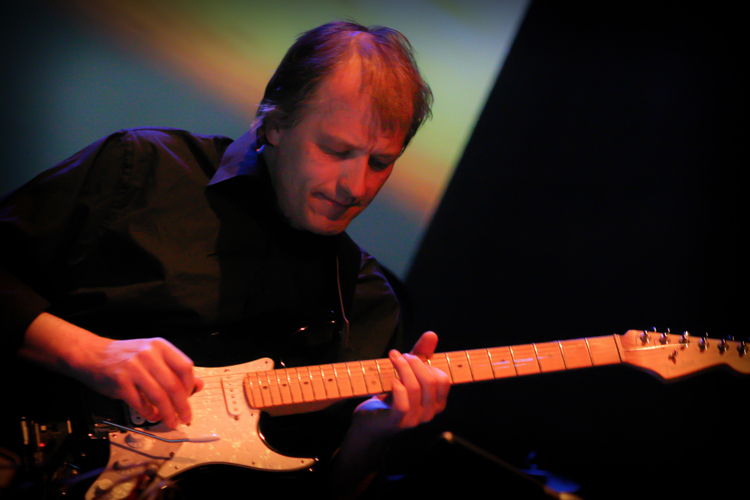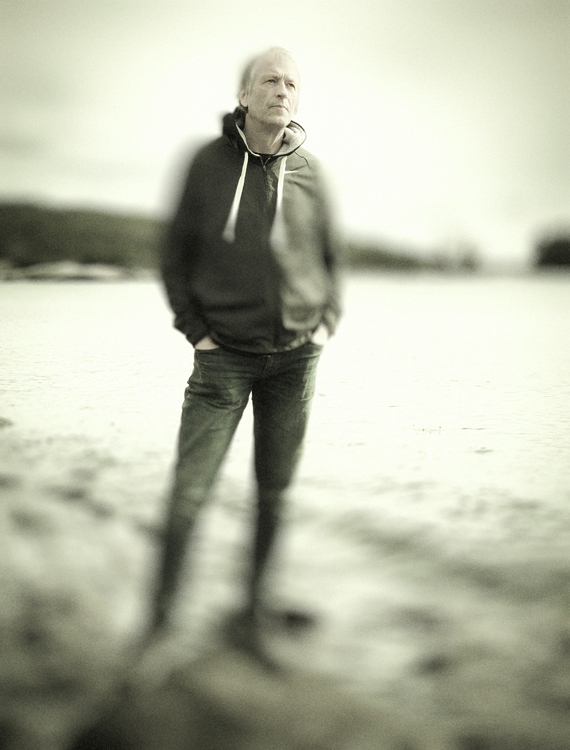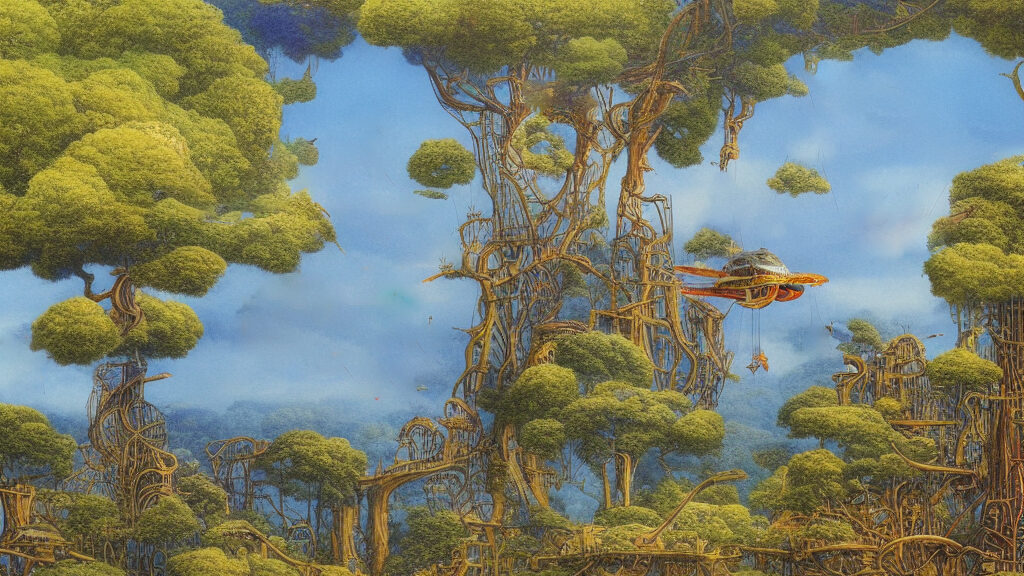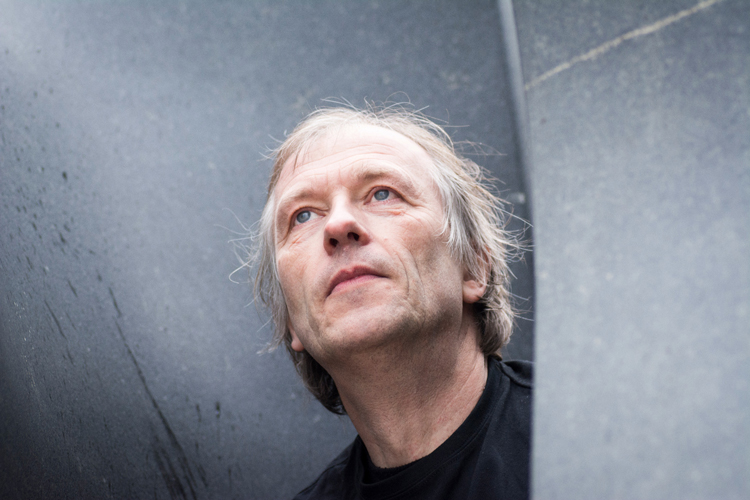Norwegian electronic music artist Erik Wøllo has a new album titled “North Star” on the Projekt Records label. The new recording was inspired by the North Star, which guided human travel for many years. Erik Wøllo is a fascinating musician and composer with a sizable catalog of captivating albums. He talked to Progressive Rock Central about his career and the new album.
What are your fondest musical memories?
There are many memories, so it is hard to choose which ones to pick. I have been a professional artist for 40 years now. I started to play the guitar at 11, and watching some of my heroes at that time on TV made a huge impact on me. After seeing Mike Oldfield performing Tubular Bells in 1973 on the Norwegian TV, I decided to become a composer! I discovered that it was possible to make longer form compositions, using regular rock instruments. (The clip is now possible to watch on Youtube, Live BBC 1973). I still have the album CD in my car!
There have been a lot of moments since then, of course. Like seeing Klaus Schulze in 1984, Pink Floyd in 1994 and King Crimson in Oslo two years ago. I hope to get the chance to see Jeff Beck once in the future… Also I have some good memories of myself performing at concerts, when everything seems to be working, with a perfect good sounding venue with a nice audience.
What do you consider as the essential elements of your music?
Repeated rhythmic patterns together with hints of tonal melodic elements above layers of textured atmospheres, is perhaps a simple description. Rhythm and timing has always been important to me, also on the more ambient and floating compositions. Even on tracks that are sustained and stretched out in time. And there are no chords, I only use certain scales that the whole tonality is centered around. I am also very interested in the musical processes. Especially repetition processes, in which movements are generated solely by extended repetitions. I try to create each composition to be a specific living breathing organism, like a state of mind.
You are a very prolific artist. How did your musical ideas evolve throughout the years from your debut album to your new recording, North Star?
I started to compose my own music at about 18, when still in school. At that time my compositions were often just made as a basis for improvisation, written out as a score in a Real Book style. There was a melody, some chords and everything else was arranged with improvisation in mind. Some of these are released on my first album, “Where it all begins” (1983).
When I started to build my own studio in 1984, everything changed. I made the albums “Traces” and “Silver Beach“, where everything was composed in a minimal electronic style, with no improvisation. Elements from these albums I still use in my music today. But much more defined. More ambient and atmospheric, with longer minimalistic sections or zones.
“North Star” is almost all done on various electric guitars. I do not want to limit myself as an electronic artist only. Albums like “Guitar Nova” (1998) and “Blue Sky, Red Guitars” (2004) are both acoustic guitar albums. Basically I make the same tune, over and over again, just with small variations…. I have some visions and ideas that I tend to go back to, revisit them and write them out in new versions and new arrangements. The instrumentation of music is just the surface. Compare it to a visual artist using different techniques like oil on canvas, water colors, or even video art, etc.

You have created your own electronic music style that is highly recognizable. A lot of people associate electronic music with keyboards but you are a guitarist. How did you get involved with electronic music?
As a young guitarist I heard these interesting sounds from Pink Floyd and Tangerine Dreams that were not possible to create with a guitar. That became a problem for me, to express what I wanted to do with just the guitar. The guitar was way too limited, and still is to me. Around 1982, I had the chance to borrow and explore a synthesizer, which really opened up my soundworld. And in 1984, when the MIDI equipment became available, I started to build my own studio. That was like heaven, I could work more as a painter would do. Spending time, carving out the soundscapes, using the studio as an instrument. Adding layers of sound, and making music for tape and speakers for release on LP or CD. But I have kept using the guitar in my work, of course. That is my strength and makes my music very personal. With that specific personal human touch. A lot of the music is actually performed from a guitar, triggering various synthesizers.
Your music is often described as cinematic. Where do you get your inspiration from?
I always have had a strong inner visual skill. I also make my own images, photos or paintings. I guess there is a connection there. And I love watching movies, and notice how the music affects and colors the meaning of the images and the story.
For me when I listen to music, I always look for a feeling of being transported to a place. If not, I am not that interested. And when I compose, it just feels natural for me to imagine that certain sounds will bring you to certain places or spaces. A sense of being somewhere. An idea that the music can send you to other places. But very abstract, I do not always want to put concrete words for it. And I rarely use any vocals. If so, I use vocals with no words or lyrics. Music is more directly and more profoundly moving the soul when unencumbered by words. A story told without words, where you can make your own inner images.
You have collaborated with other well-known American, British, and German electronic music artists. How do you collaborate in these cases? Is it over the internet or do you ever get together in person? In addition, how does your music differ in the case of these collaborations?
I have worked with some amazing musicians in this genre during my career. Steve Roach, Michael Stearns, Ian Boddy and many others. Personal relationships are important of course, and it often starts with meeting each other in person, and then we work together in a studio as a start of a project. After that we usually continue sending files back and forth. Working over the internet is a great way of working, I have got used to that now and we have done that a lot. It just feels natural these days. We are also using Skype or Zoom, to communicate and discuss details.
The nice thing about working this way, is that each of us can sit alone and add elements to the received files. Without using any words. In a studio situation, words and comments can sometimes be in the way of the creative process. It is always very exciting to receive files, and hear those unexpected results!
The idea behind a collaboration, at least to me is that the music will be a new hybrid with personal elements from each. Kind of a next level for both of us. The album I did with Michael Stearns was a fantastic project, a perfect collaboration. We called it “Convergence”, which as a word really describes what the album is about. A convergence is when two or more things come together to form a new whole.
What instruments and equipment do you use to create your albums?
I have 4 different rooms, all with different set ups. A lot of synthesizers, guitars and pedals. And effect racks. And computers running different digital audio workstation programs. When I start on an album I like to reduce the amount of instruments. Like, just a couple of synths, two or three guitars etc. That is the challenge today, to reduce the amount of options. Also to give the album or project a certain character.
I use a mixture of digital and analogue synthesizers, old and new. I am not so much into modular synths, although I have a small Doepfer set up. Seems like everyone is into that now, for various reasons. Through my career I have seen trends come and go, but I always try to make music that is not so dependent on the type of equipment.
I have a cottage in my home village where I was born, where I go once a month. There I write the basic elements of the music, and have done that for decades now. All the way back to “Traces” in 1985. Then I mix the whole project in my main studio, arranging and adding what is needed.
You have released a lot of albums throughout the years. Do you control your entire catalog?
Most of my albums I own all the rights. I license them to various labels. For the last 10 years I have worked with Projekt Records in the USA, which works fantastic.
Mainstream media does not provide an easy outlet for progressive music in general. In what ways are you promoting your music?
We promote through the regular channels, via distribution in the USA and Europe for both digital and physical releases. But actually the best place today is really on Bandcamp. As well as the label’s own websites. I think we live in a fantastic time now, where you can reach out to so many listeners through the internet. I often think about the bad times in the 80-90s, when you were so dependent on the major labels and the arrogance of the mainstream media. Now everything is possible, and we have much more direct contact with the listeners. Today the artist makes music for listeners, whereas before they had to make music for the AR and the labels to get the music out there.
What advice would you give to beginners who are anxious and want to make music outside of the pop mainstream?
Find an expression or genre that corresponds with your personality. And to have any kind of success, you really have to develop your own style in that particular genre. Do your own thing, no matter what others think. That can be hard to figure out, and also it can take some time and effort. Be patient. The gear is secondary. It is not wasted to have some education as well, depending on what you want. To be an artist and composer can be a lonesome thing. If you want to do it on a professional level, it is a way of living. So it is not for everyone.

If you could gather any other additional musicians, or bands, to collaborate with, whom would that be?
I have been a fan of Jon Hassel for many decades now. I met him a few years ago in Bergen, and we had a lot of ideas in common. He is getting older now, and needs some health care. Another giant is Ryuichi Sakamoto! A fantastic artist, both as a performer and composer. I saw him in London many years ago, he did a solo piano concert together with a string quartet. But he started the whole evening, doing abstract electronics!
Aside from the release of North Star, do you have any additional upcoming projects to share with us?
I am working on a new album, more in the vein of “Recurrence” (released earlier this year). “North Star” is a guitar oriented album, and very quiet, poetic and ambient. The next album will be electronic and synthesizer based again. I think, time will show….


I listen to your music everyday… it inspires me and my creativity… I am interested in composition and performance…recording…seem to be limited in ideas and moving forward… working with pedals and effects… looking for greater spiritual influence.
Do you have any advice please?